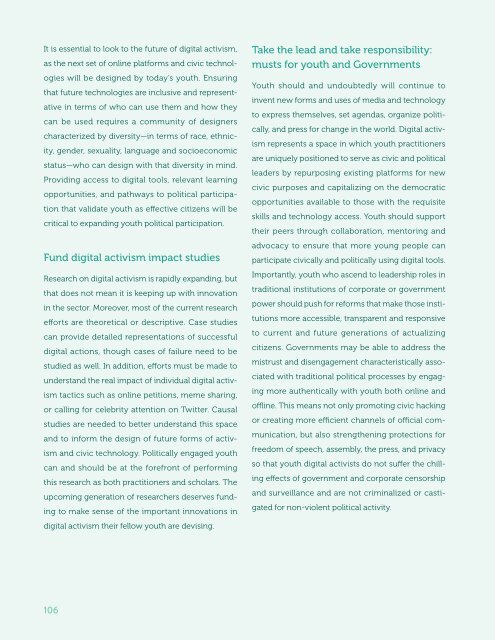YOUTH CIVIC
JieguI2U
JieguI2U
Create successful ePaper yourself
Turn your PDF publications into a flip-book with our unique Google optimized e-Paper software.
It is essential to look to the future of digital activism,<br />
as the next set of online platforms and civic technologies<br />
will be designed by today’s youth. Ensuring<br />
that future technologies are inclusive and representative<br />
in terms of who can use them and how they<br />
can be used requires a community of designers<br />
characterized by diversity—in terms of race, ethnicity,<br />
gender, sexuality, language and socioeconomic<br />
status—who can design with that diversity in mind.<br />
Providing access to digital tools, relevant learning<br />
opportunities, and pathways to political participation<br />
that validate youth as effective citizens will be<br />
critical to expanding youth political participation.<br />
Fund digital activism impact studies<br />
Research on digital activism is rapidly expanding, but<br />
that does not mean it is keeping up with innovation<br />
in the sector. Moreover, most of the current research<br />
efforts are theoretical or descriptive. Case studies<br />
can provide detailed representations of successful<br />
digital actions, though cases of failure need to be<br />
studied as well. In addition, efforts must be made to<br />
understand the real impact of individual digital activism<br />
tactics such as online petitions, meme sharing,<br />
or calling for celebrity attention on Twitter. Causal<br />
studies are needed to better understand this space<br />
and to inform the design of future forms of activism<br />
and civic technology. Politically engaged youth<br />
can and should be at the forefront of performing<br />
this research as both practitioners and scholars. The<br />
upcoming generation of researchers deserves funding<br />
to make sense of the important innovations in<br />
digital activism their fellow youth are devising.<br />
Take the lead and take responsibility:<br />
musts for youth and Governments<br />
Youth should and undoubtedly will continue to<br />
invent new forms and uses of media and technology<br />
to express themselves, set agendas, organize politically,<br />
and press for change in the world. Digital activism<br />
represents a space in which youth practitioners<br />
are uniquely positioned to serve as civic and political<br />
leaders by repurposing existing platforms for new<br />
civic purposes and capitalizing on the democratic<br />
opportunities available to those with the requisite<br />
skills and technology access. Youth should support<br />
their peers through collaboration, mentoring and<br />
advocacy to ensure that more young people can<br />
participate civically and politically using digital tools.<br />
Importantly, youth who ascend to leadership roles in<br />
traditional institutions of corporate or government<br />
power should push for reforms that make those institutions<br />
more accessible, transparent and responsive<br />
to current and future generations of actualizing<br />
citizens. Governments may be able to address the<br />
mistrust and disengagement characteristically associated<br />
with traditional political processes by engaging<br />
more authentically with youth both online and<br />
offline. This means not only promoting civic hacking<br />
or creating more efficient channels of official communication,<br />
but also strengthening protections for<br />
freedom of speech, assembly, the press, and privacy<br />
so that youth digital activists do not suffer the chilling<br />
effects of government and corporate censorship<br />
and surveillance and are not criminalized or castigated<br />
for non-violent political activity.<br />
106


